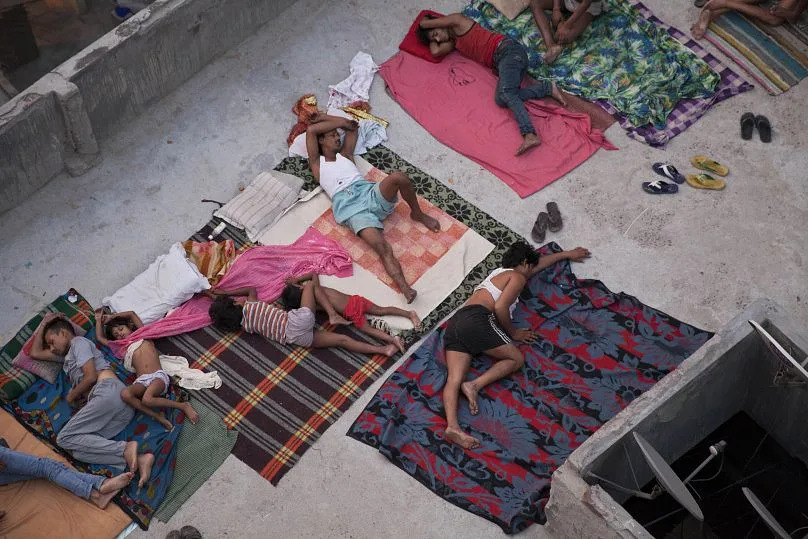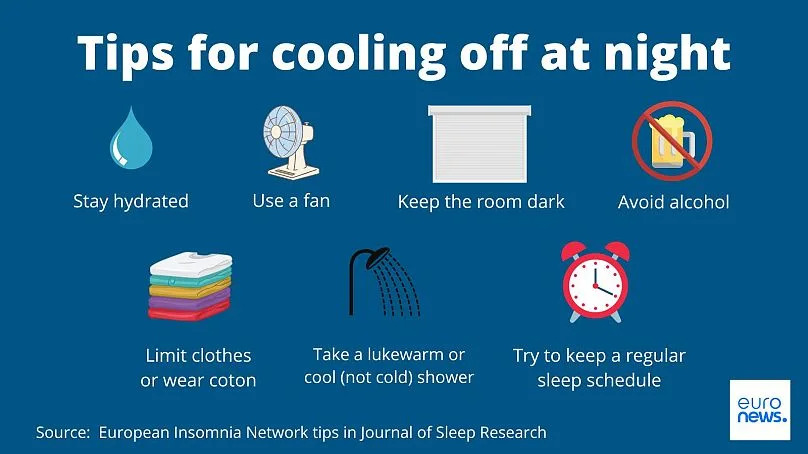From uk.news.yahoo.com
As parts of Europe suffocate from soaring temperatures, some may notice that it can be harder to get a decent night of sleep.
Yet getting an adequate amount of sleep is essential for our well-being with sleep deprivation linked to several chronic health conditions including high blood pressure, obesity and depression.
As summer heatwaves become more frequent amid climate change, here’s a look at how our sleep could be impacted and what you can do to cool down before bed.
How does heat impact our sleep?
Experts recommend sleeping in a room that is between 15 to 20 C for the best night’s sleep, with some research showing that people do not sleep well when the environment is either too warm or too cold.
Kelton Minor, a postdoctoral research scientist at Columbia University in the US, published a study earlier this year that analysed millions of records to determine the impact of temperature on people’s sleep.
“We found that under normal living routines, people appear far better at adapting to colder outside temperatures than hotter conditions,” he told Euronews Next.
“Across seasons, demographics, and different climate contexts, warmer outside temperatures consistently harm and erode sleep, with the amount of sleep loss progressively increasing as temperatures become hotter,” he added.
Night time temperatures greater than 25 C increased the probability of getting fewer than seven hours of sleep by 3.5 per cent, the researchers found.
This can lead to a host of problems related to lack of sleep including occupational injury, worsened cognitive functioning, and risk for cardiovascular disease, Minor said.
Some studies have shown that exposure to humid heat during sleep can increase wakefulness and decrease rapid eye movement (REM) sleep and slow wave sleep (SWS). It can also impact your body’s temperature regulation during sleep.
Dr Milena Pavlova, an associate professor of neurology at Harvard University and neurologist at Brigham and Women's Hospital in the US said that "having frequent sleep disruptions and a lower sleep amount has a very negative effect on virtually any disease that has been studied in relation to sleep".
"Recent studies have shown that during sleep is when we actually clear the toxins from our brain, and these are the same toxins that tend to accumulate in pathological conditions like Alzheimer's," she said.
"More heatwaves (cause) more disturbed sleep, (though) we don't have a measure yet for this, we can be suspicious that this may actually cause an increase in conditions (such as) cognitive disorders".
Older individuals, who already have a higher prevalence of insomnia, could also be more vulnerable to heatwaves, with one study suggesting that even mild heat exposure can decrease REM sleep for older men.
"Anything that is disordered in terms of sleep, particularly for people who have difficulty falling or staying asleep, will get worse," said Pavlova.
What can you do to get a better night’s sleep?
An analysis published in the Journal of Sleep Research last year said that some typical methods for treating insomnia can help people to get a better night’s sleep during heatwaves.
“Although not all who struggle with heatwave-related sleep problems may have insomnia, these tips about temperature management can also serve those who normally do not have sleep complaints,” the authors said.
They recommend several methods for cooling down before going to bed including staying hydrated, limiting clothing or wearing cotton, avoiding alcohol, and taking a lukewarm or cool (not cold) shower.
Fans can help to cool down the room without using as much energy as air conditioning.
While naps can be useful in extreme heat, the researchers said they should be limited to fewer than 20 minutes and not be taken too late in the afternoon.
Pavlova recommends "general sleep hygiene (including) having regularity to the sleep cycle, using the bed for sleep and not for other things and avoiding heat sources close to the bed (such as your computer)".
Policymakers, meanwhile, should encourage equitable access to air conditioning and sustainable energy sources to handle the increased demand, according to Minor, as well as increasing tree coverage and vegetation.
“Unlike air conditioning, these measures can lower local environmental temperatures without discharging waste heat into surrounding areas,” he said.
“This also presents an opportunity for architects, engineers, and designers to contribute positively towards promoting resilient sleep in a warming world”.
How can climate change impact our sleep?
Temperatures are rising rapidly as humans continue to release greenhouse gases into the atmosphere.
July 2023 had the highest global surface air temperature on record for any month becoming the warmest in Earth’s recent history, according to Copernicus, the EU’s earth observation programme.
In Europe, temperatures have increased more than twice the global average over the past three decades.
Minor said that many people aren’t aware that night time temperatures are rising faster than daytime temperatures in most populated regions. This, in turn, will impact people’s sleep.
In his study released in May, they used global climate models to anticipate future sleep loss and found that if countries continue emitting greenhouse gases at the current rate, by 2099 each person could lose an average of 50 to 58 hours of sleep per year.
“This highlights that efforts to curb greenhouse gas concentrations today could help alleviate the uneven impact of night-time warming on human sleep loss globally,” said Minor.
https://uk.news.yahoo.com/heatwaves-harm-erode-sleep-cool-115243287.html


No comments:
Post a Comment